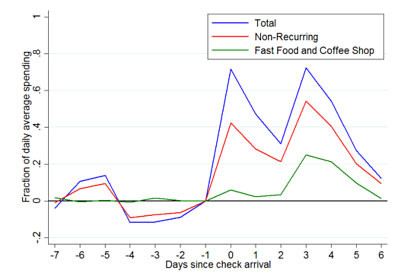Tapping real-time financial data can improve economic policymaking
Measuring the nation’s economic health has long been a slow, costly and imprecise exercise, but researchers at the University of California, Berkeley have helped develop a new way to measure real-time consumer behavior that could vastly improve economic policymaking.
The findings by Sachar Kariv, a professor of economics and chair of the UC Berkeley Economics Department, along with co-author Steve Tadelis, an associate professor of business and public policy at UC Berkeley’s Haas School of Business, and researchers from the University of Michigan and Arizona State University appear in today’s issue of the journal Science.

Traditionally, the researchers said, economic analysts have been forced to rely on large-scale surveys such as the Consumer Expenditure Survey or the Panel Study of Income Dynamics. But such surveys are complex and expensive to implement, so they are conducted infrequently and with modest-sized samples, with results released after substantial time lags.
Because it is now possible to obtain fast, accurate, reliable, detailed, real-time and comprehensive information about daily personal financial spending and saving actions, government agencies and research organizations can capture rapidly-changing economic information generated by households and businesses and adjust course if necessary, the researchers said.

“The data generated by online and mobile financial applications such as Check, as well as data from social media, online marketplaces and e-commerce sites can be analyzed to address questions that policymakers, firms and individuals must answer to make better decisions,” said Tadelis.
Together, the research team examined the transactions over 10 months of about 75,000 users of the free mobile payments app, Check, who were randomly selected from a pool of 1.5 million U.S.-based users with at least one financial account – such as a credit card, bank account, insurance policy, utility bill, mortgage, pension or investment account – that the app can access regularly.
The sample recorded more than 61 million transactions, with individuals using an average of about six different accounts, and spending with credit cards about half as often as with checking accounts. The researchers, working with Check, developed a data infrastructure to estimate with precision individual spending in relation to anticipated income.
Findings of the paper, “Harnessing Naturally-Occurring Data to Measure the Response of Spending to Income,” effectively test a major economic theory called the Permanent Income Hypothesis (PIH), which maintains that the timing of anticipated personal income doesn’t relate to spending.

The study showed that on average, an individual’s total spending actually rises substantially above their average daily spending the day a paycheck or Social Security check arrives, and stays high for at least another four days. But that pattern occurs primarily with those constrained in their ability to borrow, or by the interest rates they have to pay.
Armed with this information and new ways to collect amounts of personal financial data, the research team concluded that leaders considering how and when to stimulate the economy can do a better job choosing policies that match more exactly how individuals will respond.
“Policy prescription … depends on precise estimates,” the researchers write in Science. “The value of tax rebates aimed at stimulating the economy, for example, depends critically on whether the spending rate is 20 percent, versus 50 percent, among what categories of expenditure, and over what time horizon.”
Emmanuel Saez, a UC Berkeley economist and head of the Center for Equitable Growth at UC Berkeley, called the study “pathbreaking” for its use of a dataset with real time and detailed information on incoming and spending.
“This is a great example,” he said, “of how new technologies are generating new big data that can also have incredible value for scientific research. UC Berkeley is ahead of the curve on big data, having recently launched the Berkeley Institute for Data Science, which will cut across many disciplines, including economics.”
The Check data is collected on accounts daily and organized intuitively so users can get a comprehensive view of their financial situation via computer, smartphone or tablet. The study sample covered a wide range of ages, geography and incomes.
